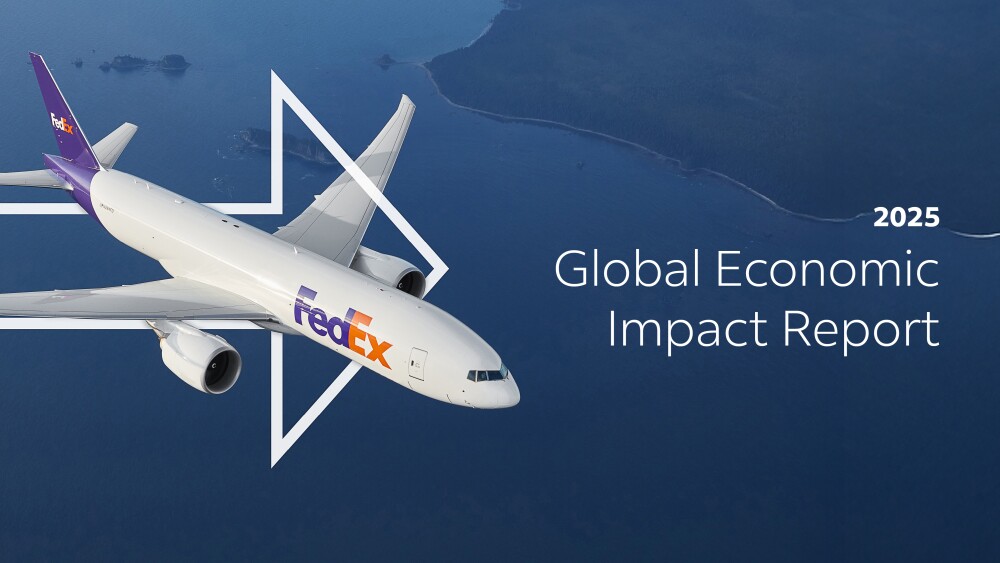Memphis, Tenn., October 30, 2025 – FedEx Corp. (NYSE: FDX) today released its annual Global Economic Impact Report, highlighting the company’s worldwide network and role in fueling innovation during its 2025 fiscal year (FY25).Produced in consultation with Dun & Bradstreet (NYSE: DNB), a leading provider of business decisioning data and analytics, the study demonstrates the positive impact FedEx has on individuals, businesses, and communities around the world — otherwise known as the “FedEx Effect.”
“For more than 50 years, FedEx has shaped global commerce by offering innovative shipping services that bring communities closer together,” said Raj Subramaniam, president and CEO, FedEx Corporation. “Our culture of innovation, paired with our team’s steadfast commitment to outstanding service and bold ideas, enabled the FedEx network to continue fueling worldwide progress this year through a rapidly evolving trade landscape and shifts in supply chains.”
The report reveals that FedEx contributed $126 billion in direct and indirect impact to the global economy in FY25. This activity reflects the scale of the FedEx network and the company’s ongoing efforts to enhance its services and optimize its operations during its first fiscal year operating as one FedEx.
Europe impact
FedEx operates an extensive, integrated air and road network that reaches 45 countries and territories across Europe, with key hubs at Paris-Charles de Gaulle (France), and Liège (Belgium). The company continues to strengthen Europe’s connectivity to global markets, empower small businesses with digital shipping tools, and support sustainable logistics solutions across the continent.
“Europe remains a cornerstone of the FedEx global network with outstanding international connectivity and a vast intra-European network,” said Wouter Roels, President of FedEx Europe. “From state-of-the-art facilities in France, Spain and the Netherlands, to new automated operations across Eastern Europe, we’re investing in technology and infrastructure that make supply chains smarter, and faster for our customers.”
In FY25, FedEx directly contributed 0.3% to net economic output in Europe’s Transportation, Storage, and Communications sector[1] and indirectly contributed $2.8 billion to the region’s overall economy — including $870 million to its Transportation, Storage, and Communications sector and $259 million to its Manufacturing sector.[2] Together, the combined direct and indirect contributions from FedEx to Europe’s economy totaled approximately $11.1 billion.
FedEx also spent $8.5 billion with suppliers in Europe during calendar year 2024 (CY24), 71% of which went to small businesses. Across the region, 86% of FedEx suppliers are small enterprises, underscoring the company’s commitment to supporting local entrepreneurship and supply chain resilience.
Global impact
FedEx operates the world’s largest express transportation company, serving more than 220 countries and territories and employing more than 500,000 people across 5,000 facilities. The company transports approximately 17 million packages per day and more than $2 trillion worth of goods every year. The scale of this network drives the magnitude of the company’s global impact.
Notable global results highlighted in the FY25 FedEx Global Economic Impact Report include:
- Trade: Leveraging the company’s long history of connecting businesses around the world, deep understanding of the complexities of global supply chains, and expertise in customs brokerage services positions, FedEx continues to be a valuable trade partner and help customers navigate and optimize their supply chains. By analyzing changing regulations and trade patterns, FedEx has been able to adjust capacity across its network to meet customers’ evolving needs.
- Operational enhancements: FedEx continued to improve its network in FY25, notably through the ongoing optimization of its surface network into a single transportation system and redesign of its international air network to align capacity with shifting global trade flows. Other multi-year investments continued, including the completion of an automated secondary sort facility in Memphis, a new Life Science Center in the Netherlands, a freight and parcel facility with advanced automation in Thailand, and a new international service station in Brazil.
- Supply chain: In calendar year 2024, 90% of the 100,000 suppliers FedEx contracted with were small- and medium-sized businesses (SAMs), supporting hundreds of thousands of jobs.
- Intelligent innovation: FedEx is leveraging its industrial network and the data it captures to develop digital, AI-driven tools and solutions — modernizing operations to create smarter, more flexible supply chains, and streamlining the international shipping process. FedEx expanded its AI-driven digital brokerage solutions that improve the customs clearance experience, reduce delays, and help customers adapt to evolving regulatory requirements across regions.
- Small businesses: FedEx offers a portfolio of solutions and programs that are designed to help SAMs accelerate their growth and extend their global reach. In FY25, the company expanded the availability of several digital innovations designed to streamline international trade and global supply chain management, including launching the Collaborative Shipping Tool to all FedEx import customers in APAC, Canada, MEISA, and the U.S.
- Sustainability: The company advanced toward its goal to achieve carbon-neutral operations by 2040 through continued investments in renewable energy to power its facilities, fleet electrification, alternative fuels, and air fleet modernization. In FY25, FedEx began its first major U.S. deployment of sustainable aviation fuel (SAF), securing more than 3 million gallons of blended SAF for use at Los Angeles International Airport (LAX) over the course of a year.
- Giving: FedEx Cares is committed to strengthening communities worldwide through charitable giving, employee volunteerism, and in-kind shipping support. In FY25, FedEx contributed $55.5 million to nonprofit initiatives, dedicated more than 81,000 volunteer hours among team members, and harnessed its global network to deliver critical disaster relief to communities in need, quickly and reliably.
Read the full FY25 FedEx Global Economic Impact Report and explore the FedEx Effect in communities and regions around the world at fedex.com/economicimpact.
[1] As defined by United Nations Conference on Trade and Development (UNCTAD).
[2] As defined by UNCTAD.
